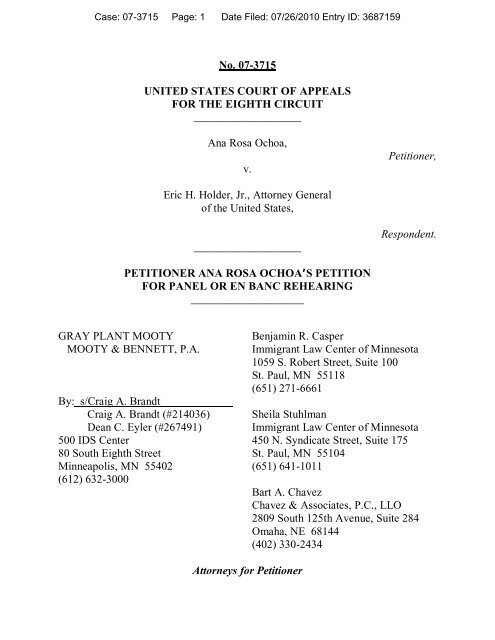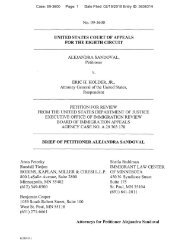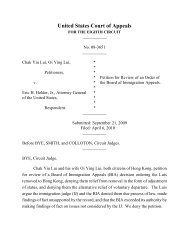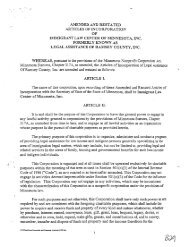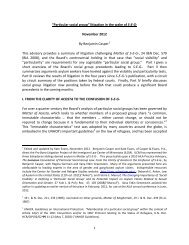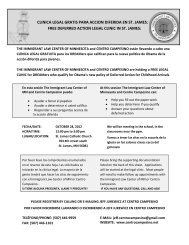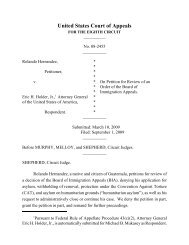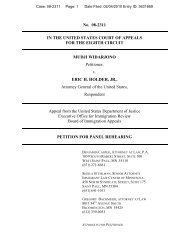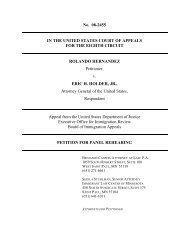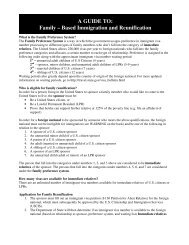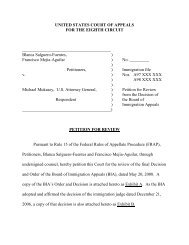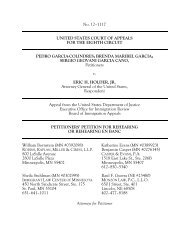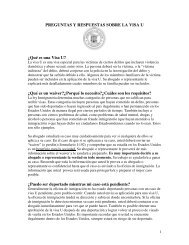this petition for rehearing - Immigrant Law Center of Minnesota
this petition for rehearing - Immigrant Law Center of Minnesota
this petition for rehearing - Immigrant Law Center of Minnesota
Create successful ePaper yourself
Turn your PDF publications into a flip-book with our unique Google optimized e-Paper software.
Case: 07-3715 Page: 1 Date Filed: 07/26/2010 Entry ID: 3687159<br />
No. 07-3715<br />
UNITED STATES COURT OF APPEALS<br />
FOR THE EIGHTH CIRCUIT<br />
___________________<br />
Ana Rosa Ochoa,<br />
v.<br />
Petitioner,<br />
Eric H. Holder, Jr., Attorney General<br />
<strong>of</strong> the United States,<br />
___________________<br />
Respondent.<br />
PETITIONER ANA ROSA OCHOA’S PETITION<br />
FOR PANEL OR EN BANC REHEARING<br />
____________________<br />
GRAY PLANT MOOTY<br />
MOOTY & BENNETT, P.A.<br />
By: s/Craig A. Brandt<br />
Craig A. Brandt (#214036)<br />
Dean C. Eyler (#267491)<br />
500 IDS <strong>Center</strong><br />
80 South Eighth Street<br />
Minneapolis, MN 55402<br />
(612) 632-3000<br />
Benjamin R. Casper<br />
<strong>Immigrant</strong> <strong>Law</strong> <strong>Center</strong> <strong>of</strong> <strong>Minnesota</strong><br />
1059 S. Robert Street, Suite 100<br />
St. Paul, MN 55118<br />
(651) 271-6661<br />
Sheila Stuhlman<br />
<strong>Immigrant</strong> <strong>Law</strong> <strong>Center</strong> <strong>of</strong> <strong>Minnesota</strong><br />
450 N. Syndicate Street, Suite 175<br />
St. Paul, MN 55104<br />
(651) 641-1011<br />
Bart A. Chavez<br />
Chavez & Associates, P.C., LLO<br />
2809 South 125th Avenue, Suite 284<br />
Omaha, NE 68144<br />
(402) 330-2434<br />
Attorneys <strong>for</strong> Petitioner
Case: 07-3715 Page: 2 Date Filed: 07/26/2010 Entry ID: 3687159<br />
Andrew Oliveira<br />
Trial Attorney<br />
U.S. Department <strong>of</strong> Justice<br />
Office <strong>of</strong> Immigration Litigation<br />
P.O. Box 878, Ben Franklin Station<br />
Washington, D.C. 20044<br />
(202) 305-8570<br />
Attorneys <strong>for</strong> Respondent
Case: 07-3715 Page: 3 Date Filed: 07/26/2010 Entry ID: 3687159<br />
PETITION<br />
Petitioner Ana Rosa Ochoa respectfully <strong>petition</strong>s the Court, under Rules 35<br />
and 40 <strong>of</strong> the Federal Rules <strong>of</strong> Appellate Procedure, to grant <strong>rehearing</strong> or <strong>rehearing</strong><br />
en banc <strong>of</strong> its decision issued on May 5, 2010.<br />
Issue I: The panel decision that <strong>this</strong> Court lacks jurisdiction to review<br />
Ochoa’s claim <strong>for</strong> abuse <strong>of</strong> discretion under Tamenut v. Mukasey, 521 F.3d 1000,<br />
1005 (8th Cir. 2008) (en banc), conflicts with a decision <strong>of</strong> the U.S. Supreme<br />
Court, SEC v. Chenery, 318 U.S. 80 (1943), because the panel failed to measure its<br />
jurisdiction according to the terms <strong>of</strong> the agency decision. The panel decision is<br />
also undermined by Kucana v. Holder, 130 S. Ct. 827 (2010), and should be<br />
reheard to maintain uni<strong>for</strong>mity with <strong>this</strong> Court’s prior decisions that have properly<br />
acknowledged the BIA’s broad discretion to construe an alien’s filing in the<br />
manner it sees fit. See Vargas v. Holder, 567 F.3d 387, 389 n.4 (8th Cir. 2009)<br />
(construing a party’s motion to remand as a motion to reopen and noting <strong>this</strong><br />
Court’s long-standing practice <strong>of</strong> reviewing denials <strong>of</strong> motions to reopen);<br />
Makatengkeng v. Gonzales, 495 F.3d 876, 886 (8th Cir. 2007) (approving <strong>of</strong> BIA’s<br />
decision to treat <strong>petition</strong>er’s motion to “admit evidence on appeal” as a reviewable<br />
motion to reopen).<br />
Issue II: Rehearing is required because the BIA order was an abuse <strong>of</strong><br />
discretion <strong>for</strong> the reasons stated in Judge Colloton’s dissent, as the BIA denied<br />
1
Case: 07-3715 Page: 4 Date Filed: 07/26/2010 Entry ID: 3687159<br />
Ms. Ochoa’s motion to reopen based on ineffective assistance <strong>of</strong> counsel without a<br />
“rational and reasoned explanation <strong>for</strong> its decision.”<br />
Issue III: This case presents a question <strong>of</strong> exceptional importance: whether<br />
the holding <strong>of</strong> Tamenut – that BIA decisions not to reopen a case sua sponte are<br />
“committed to agency discretion by law” – remains valid in light <strong>of</strong> Kucana.<br />
COURSE OF PROCEEDINGS AND DISPOSITION<br />
Ms. Ochoa is a citizen <strong>of</strong> Mexico who entered the United States in 1991.<br />
Ochoa v. Holder, 604 F.3d 546, 547 (8th Cir. 2010). In 2004, after the government<br />
initiated removal proceedings against her, Ochoa conceded removability but filed<br />
an application <strong>for</strong> cancellation <strong>of</strong> removal. Id. On January 9, 2006, an<br />
Immigration Judge (IJ) orally denied <strong>this</strong> application, a ruling which was affirmed<br />
by the Board <strong>of</strong> Immigration Appeals (BIA) on May 25, 2007.<br />
Both the IJ and the BIA determined that Ochoa had good<br />
moral character and continuous physical presence in the<br />
United States, two elements required <strong>for</strong> cancellation <strong>of</strong><br />
removal, but based their denials upon the conclusion that<br />
Ochoa failed to show that her removal would result in<br />
exceptional and extremely unusual hardship to her<br />
qualifying relatives, namely her two United States citizen<br />
children. Id.<br />
At the hearing be<strong>for</strong>e the IJ, Ochoa testified that her son, Guillermo, age 7 at<br />
the time, suffered from lead poisoning that had resulted in his learning difficulties.<br />
Id. Ochoa’s counsel then disclosed that Guillermo’s poisoning was “new to him,”<br />
and requested additional time to secure and submit related evidence. Id. When the<br />
2
Case: 07-3715 Page: 5 Date Filed: 07/26/2010 Entry ID: 3687159<br />
IJ then asked Ochoa why she had not disclosed Guillermo’s condition to her<br />
attorney, she explained that she did not think doing so was necessary.<br />
The IJ declined the request by Ochoa’s counsel <strong>for</strong> additional time, and held<br />
that Ochoa had not shown that her removal from the U.S. would cause<br />
“exceptional and extremely unusual hardship.” Id. The “IJ relied in part upon<br />
Ochoa’s failure to submit any corroborating evidence regarding her assertions<br />
about Guillermo’s needs and disabilities due to his lead poisoning.” Id. In<br />
affirming, the BIA held that the hardship claimed by Ochoa fell short <strong>of</strong> the<br />
“exceptional and extremely unusual” standard, and rejected the argument that the<br />
IJ should have continued the case to allow Ochoa’s counsel more time. Id.<br />
After obtaining new counsel, Ochoa filed a timely motion with the BIA to<br />
reopen her case based on the ineffectiveness <strong>of</strong> her prior counsel. The motion was<br />
brought pursuant to 8 C.F.R. § 1003.2(a), a regulation that authorizes the BIA to<br />
reopen or reconsider any case “on its own motion” or in response to a written<br />
motion by a party. 1<br />
In support <strong>of</strong> her motion, Ochoa submitted a bar complaint filed against her<br />
prior counsel and an affidavit describing his deficient handling <strong>of</strong> her case. Ochoa<br />
asserted that her <strong>for</strong>mer attorney failed to elicit key in<strong>for</strong>mation related to her son’s<br />
1<br />
8 C.F.R. § 1003.2(a) and a related provision, Section 1003.2(c), are set <strong>for</strong>th<br />
in full in an addendum to <strong>this</strong> Petition. The panel decision is also included in the<br />
Addendum.<br />
3
Case: 07-3715 Page: 6 Date Filed: 07/26/2010 Entry ID: 3687159<br />
disability. Administrative Record 46-50. Ochoa also submitted evidence about:<br />
the effects <strong>of</strong> lead poisoning; Guillermo’s diagnosis and treatment; his resulting<br />
learning disabilities; and the disadvantages faced by special education students in<br />
Mexico. Id. at 547-48.<br />
The BIA denied Ochoa’s motion to reopen. While noting that it was<br />
“troubled by evidence indicating that [Guillermo] suffered from educational<br />
problems stemming from … lead poisoning at the age <strong>of</strong> two,” the BIA held Ochoa<br />
had failed to demonstrate that evidence related to the hardship issue could not have<br />
been presented at her earlier hearing. Id. at 548.<br />
Ochoa then filed a timely <strong>petition</strong> with <strong>this</strong> Court seeking review <strong>of</strong> the<br />
BIA’s order denying her motion to reopen, but <strong>this</strong> Court dismissed it. A majority<br />
<strong>of</strong> the panel held that, under Tamenut, 521 F.3d 1000, <strong>this</strong> Court was precluded<br />
from reviewing the BIA’s order because Ochoa’s motion to reopen actually<br />
constituted a request that the BIA reopen the case on its own motion, which was a<br />
matter committed to agency discretion by law and thus unreviewable. 604 F.3d at<br />
549-50 (“we see no way around Tamenut’s proscription given Ochoa’s express<br />
reliance on § 1003.2(a) through her filings and argument.”).<br />
In a separate opinion, Judge Colloton disagreed with the majority’s holding.<br />
He noted that the parties were in agreement that <strong>this</strong> Court should review the BIA<br />
decision denying Ochoa’s motion. On the principal issue <strong>of</strong> whether the BIA order<br />
4
Case: 07-3715 Page: 7 Date Filed: 07/26/2010 Entry ID: 3687159<br />
was reviewable, Judge Colloton, unlike the majority, focused on the ruling by the<br />
BIA instead <strong>of</strong> on Ochoa’s motion. Id. at 551 (“we review the BIA’s decision, not<br />
Ochoa’s motion”). He noted that the BIA had treated the motion as one by a party<br />
to reopen a case 2 and said, “There is not even a hint in the BIA’s decision … that it<br />
considered whether to exercise its ‘limited discretionary powers’ to reopen cases<br />
on its own motion.” Id. at 551. 3<br />
Accordingly, Judge Colloton concluded that <strong>this</strong><br />
Court “should review the BIA’s denial [<strong>of</strong> Ochoa’s motion].” Id.<br />
Next, after declaring that the BIA ruling should be reversed if it “fail[ed] to<br />
give a rational and reasoned explanation <strong>for</strong> its decision,” Judge Colloton<br />
concluded: “the BIA’s cursory decision on Ochoa’s motion cannot withstand even<br />
<strong>this</strong> deferential review.” Id. The BIA had dealt with Ms. Ochoa’s argument about<br />
ineffective assistance <strong>of</strong> counsel “in two sentences,” but Judge Colloton found that<br />
those sentences were “not responsive to Ochoa’s argument that [her] counsel had a<br />
pr<strong>of</strong>essional obligation to inquire about matters that would assist in making a case<br />
<strong>for</strong> cancellation <strong>of</strong> removal, and that counsel should have elicited the in<strong>for</strong>mation<br />
2<br />
For example, in deciding the motion, the BIA applied the legal standard<br />
applicable to party-filed motions to reopen. Id. at 551.<br />
3<br />
Judge Colloton also concluded that the reference in Ochoa’s motion to 8<br />
C.F.R. § 1003.2(a) did not “by itself imply a request <strong>for</strong> the BIA to exercise its<br />
authority to reopen sua sponte,” and further that the text <strong>of</strong> Ochoa’s motion was<br />
not only “grammatically incoherent” but “did not state that [Ochoa] relied<br />
exclusively on” the “purely discretionary <strong>for</strong>m <strong>of</strong> relief” af<strong>for</strong>ded by sua sponte<br />
motions to reopen. Id.<br />
5
Case: 07-3715 Page: 8 Date Filed: 07/26/2010 Entry ID: 3687159<br />
about lead poisoning from Ochoa.” Id. at 552 (“The BIA may or may not believe<br />
that counsel had such an obligation, but we do not know, because the BIA never<br />
addressed the point.”)<br />
Judge Colloton noted also that the BIA’s order did not disclose “whether it<br />
believed that differences between special education services available in Mexico<br />
and in the United States would amount to ‘exceptional and extremely unusual<br />
hardship’ <strong>for</strong> [Guillermo] if his mother were removed to Mexico.” Id. “Thus,”<br />
Judge Colloton said, “we have no decision from the BIA on whether the alleged<br />
ineffective assistance <strong>of</strong> counsel caused actual prejudice in the removal<br />
proceedings.” Accordingly, Judge Colloton said he would “remand the case <strong>for</strong><br />
further proceedings with respect to Ochoa’s claim <strong>of</strong> ineffective assistance <strong>of</strong><br />
counsel.” Id.<br />
ARGUMENT<br />
I. Rehearing is Warranted Because <strong>this</strong> Court’s Jurisdiction Must Be<br />
Measured Against the Substance <strong>of</strong> the BIA’s Decision, Not a Party’s<br />
Characterization <strong>of</strong> a Motion. As is, the Court’s Decision Violates<br />
Chenery and is Inconsistent With Treatment <strong>of</strong> BIA Decisions in Past<br />
Cases Decided by <strong>this</strong> Court.<br />
The Supreme Court recently reaffirmed that motions to reopen are an<br />
“important safeguard” in immigration proceedings and the presumption favoring<br />
judicial review <strong>of</strong> administrative action. Kucana, 130 S. Ct. 827. The panel<br />
decision in <strong>this</strong> case is flawed because its restricted view <strong>of</strong> Petitioner’s motion to<br />
6
Case: 07-3715 Page: 9 Date Filed: 07/26/2010 Entry ID: 3687159<br />
reopen is inconsistent with those principles reaffirmed in Kucana, and its<br />
jurisdictional analysis focused on a misreading <strong>of</strong> Ochoa’s motion rather than on<br />
what the BIA actually decided.<br />
“The grounds upon which an administrative order must be judged are those<br />
upon which the record discloses that its action was based.” SEC v. Chenery, 318<br />
U.S. 80, 87 (1943). The panel decision in Ochoa v. Holder improperly failed to<br />
apply <strong>this</strong> principle <strong>of</strong> administrative law, which caused the Court to err by<br />
dismissing Ochoa’s <strong>petition</strong> without considering its merits.<br />
The majority opinion makes clear that its holding is based on the “stated<br />
basis <strong>for</strong> Ochoa’s motion” and not on “the board’s treatment <strong>of</strong> the motion.” 604<br />
F.3d at 549. But, as Judge Colloton noted, the Court’s task in <strong>this</strong> case was to<br />
“review the BIA’s decision, not Ochoa’s motion.” Id. at 551. Thus, Judge<br />
Colloton’s approach, i.e., determining reviewability by focusing on the grounds<br />
applied by the agency rather than on the particulars <strong>of</strong> the motion presented to the<br />
agency, is the one mandated by Chenery.<br />
Moreover, as Judge Colloton correctly concluded, the record leaves no doubt<br />
that in deciding Ochoa’s motion, the BIA treated it as if it were a motion by a party<br />
to reopen, which is reviewable under Tamenut. See 521 F.3d at 1003. The BIA<br />
said that the motion was “timely,” a conclusion “relevant only to a motion by a<br />
party, as there is no time limit on the BIA’s authority to reopen on its own<br />
7
Case: 07-3715 Page: 10 Date Filed: 07/26/2010 Entry ID: 3687159<br />
motion.” 604 F.3d at 551 (Colloton, J., dissenting). In addition, the BIA analyzed<br />
the motion according to the standards established in Matter <strong>of</strong> Coelho, 20 I&N<br />
Dec. 464 (BIA 1992), which involved a motion to reopen by a party. Thus,<br />
because the BIA decided Ochoa’s motion on grounds applicable to a timely, partyinitiated<br />
motion to reopen, which is reviewable, the majority erred in holding the<br />
matter unreviewable.<br />
The majority incorrectly analyzed the sole issue that it considered decisive,<br />
i.e., whether Ochoa’s motion was one by a party to reopen or instead a motion<br />
seeking only the sua sponte exercise <strong>of</strong> discretion by the BIA. Ms. Ochoa’s<br />
reference to 8 C.F.R. § 1003.2(a) in her motion did “not by itself imply a request<br />
<strong>for</strong> the BIA to exercise its authority to reopen sua sponte,” because the subsection<br />
in question sets <strong>for</strong>th “[g]eneral” provisions about the filing <strong>of</strong> motions to reopen,<br />
including motions as <strong>of</strong> right by a party. 604 F.3d at 551 (Colloton, J., dissenting)<br />
Moreover, Ochoa’s motion, while inartfully phrased, nowhere stated that Ochoa<br />
relied exclusively on a request that the BIA exercise its discretion to reopen the<br />
matter. Id. (“an alien may follow a belt-and-suspenders approach, asking the BIA<br />
to reopen on the alien’s timely motion and on the BIA’s own motion”).<br />
Finally, prior decisions properly recognize that appellate courts have<br />
jurisdiction to review agency decisions on motions that the agency construes as<br />
motions to reopen. See, e.g., Vargas, 567 F.3d at 389 n.4 (reviewing BIA’s denial<br />
8
Case: 07-3715 Page: 11 Date Filed: 07/26/2010 Entry ID: 3687159<br />
<strong>of</strong> “motion to remand,” which court construed as motion to reopen, and noting <strong>this</strong><br />
Court’s “‘long-standing practice <strong>of</strong> reviewing the denial <strong>of</strong> motions to reopen’”)<br />
(quoting Miah v. Mukasey, 519 F.3d 784, 789 n.1 (8th Cir. 2008)); Makatengkeng ,<br />
495 F.3d at 886 (8th Cir. 2007) (approving <strong>of</strong> BIA’s decision to treat motion to<br />
“admit evidence on appeal” as a reviewable motion to reopen); see also Habchy v.<br />
Gonzales, 471 F.3d 858, 864 (8th Cir. 2006) (recognizing that immigration judge<br />
was free to interpret a party’s motion to reconsider as a supplement to an earlier<br />
deficient motion to reopen).<br />
II.<br />
Rehearing is Necessary Because the BIA Ignored Important Elements <strong>of</strong><br />
Petitioner’s Claim <strong>of</strong> Ineffective Assistance <strong>of</strong> Counsel.<br />
The essence <strong>of</strong> Ochoa’s motion to reopen was that if her prior counsel had<br />
not failed to obtain and submit evidence about the hardship that her removal from<br />
the U.S. would cause her young son Guillermo, Ochoa could have made the<br />
required showing <strong>of</strong> “exceptional and extremely unusual hardship” in support <strong>of</strong><br />
her application <strong>for</strong> cancellation <strong>of</strong> removal. The evidence that should have been<br />
but was not submitted by prior counsel included evidence <strong>of</strong> Guillermo’s leadrelated<br />
learning disability and that Mexico “does not give every child with<br />
educational disabilities the services required, while such services are ‘mandatory’<br />
in the U.S.” 604 F.3d at 552.<br />
Rehearing should be granted because the BIA order denying the motion to<br />
reopen failed, as required, “to give a rational and reasoned explanation <strong>for</strong> its<br />
9
Case: 07-3715 Page: 12 Date Filed: 07/26/2010 Entry ID: 3687159<br />
decision.” 604 F.3d at 551 (Colloton, J., dissenting). As noted, the BIA addressed<br />
Ochoa’s argument in two sentences, but neither <strong>of</strong> those sentences provided any<br />
explanation <strong>for</strong> the BIA’s decision to reject Ms. Ochoa’s assertion that her prior<br />
counsel had breached his duty to search <strong>for</strong> and submit relevant evidence. Judge<br />
Colloton explained these deficiencies:<br />
i<br />
i<br />
The BIA’s order first relied upon Ochoa’s admission to the IJ that she<br />
had not thought that the lead poisoning issue was necessary to her<br />
case, but Judge Colloton noted that <strong>this</strong> concession was simply “not<br />
responsive to Ochoa’s argument that [her] counsel had a pr<strong>of</strong>essional<br />
obligation to inquire about matters that would assist in making a case<br />
<strong>for</strong> cancellation <strong>of</strong> removal, and that counsel should have elicited the<br />
in<strong>for</strong>mation about lead poisoning from Ochoa.” Id. at 552.<br />
The BIA’s second stated reason <strong>for</strong> its decision – that Guillermo’s<br />
lead levels were in the normal range at the time <strong>of</strong> his most-recent<br />
reading in 2002 – was similarly not pertinent to the contention Ochoa<br />
had presented to the BIA: that Guillermo “suffered lead poisoning in<br />
his early years,” and that <strong>this</strong> poisoning resulted in educational<br />
disabilities that are still present. Id.<br />
The reasons cited by the BIA were not pertinent to the main point <strong>of</strong><br />
Ochoa’s motion to reopen, and thus the BIA abused its discretion. See Habchy v.<br />
Filip, 552 F.3d 911, 913 (8th Cir. 2009) (“The BIA abused its discretion in<br />
denying Habchy’s latest motion to reopen ins<strong>of</strong>ar as it failed to consider the<br />
entirety <strong>of</strong> Habchy’s claim <strong>for</strong> relief.”). Moreover, since the BIA never addressed<br />
“whether it believed that differences between special education services available<br />
in Mexico and in the United States would amount to ‘exceptional and extremely<br />
unusual hardship’ <strong>for</strong> Ochoa’s son if his mother were removed to Mexico,” <strong>for</strong> <strong>this</strong><br />
10
Case: 07-3715 Page: 13 Date Filed: 07/26/2010 Entry ID: 3687159<br />
reason also the BIA ruling failed to provide a “rational and reasoned explanation”<br />
<strong>for</strong> its decision. Where the BIA fails to even address the principal issue, its<br />
decision falls below the minimum acceptable standard <strong>of</strong> justice. See, e.g., id. at<br />
915 (“the BIA had an obligation to consider the evidence Habchy presented in light<br />
<strong>of</strong> all <strong>of</strong> his claims.”).<br />
Ochoa suffered actual prejudice from the ineffective assistance <strong>of</strong> her <strong>for</strong>mer<br />
counsel in that she would likely have established all the necessary elements <strong>of</strong> a<br />
claim <strong>for</strong> cancellation <strong>of</strong> removal but <strong>for</strong> her counsel’s failure to ask necessary<br />
questions regarding her qualifying relatives. In a similar case, the court found<br />
ineffective assistance <strong>of</strong> counsel when an attorney failed to introduce evidence to<br />
support the immigrant’s required claim <strong>of</strong> hardship to a qualifying relative.<br />
Morales Apolinar v. Mukasey, 514 F.3d 893, 899 (9th Cir. 2008) (“Any competent<br />
attorney would have recognized the strategic value <strong>of</strong> strengthening [<strong>petition</strong>er’s]<br />
case by qualifying her mother.”).<br />
The failure by Ochoa’s counsel to marshal and submit evidence <strong>of</strong><br />
Guillermo’s lead poisoning, the resulting disability, and how Ochoa’s removal<br />
would severely and detrimentally impact him and his access to the special<br />
education system in <strong>this</strong> country, is a stark example <strong>of</strong> ineffective assistance <strong>of</strong><br />
counsel that should justify granting a motion to reopen. This Court recently<br />
recognized that an attorney’s failure to properly notify a client <strong>of</strong> a hearing date<br />
11
Case: 07-3715 Page: 14 Date Filed: 07/26/2010 Entry ID: 3687159<br />
provided a sufficient basis <strong>for</strong> a motion to reopen based on ineffective assistance <strong>of</strong><br />
counsel. Dominguez-Capistran v. Gonzales, 438 F.3d 876, 878 (8th Cir. 2006);<br />
accord Aris v. Mukasey, 517 F.3d 595 (2d Cir. 2008) (holding that BIA abused its<br />
discretion in denying a motion to reopen based on ineffective assistance <strong>of</strong> counsel<br />
where counsel misin<strong>for</strong>med client about his required appearance at a hearing).<br />
Similarly, the Ninth Circuit has held that the BIA abused its discretion in denying a<br />
motion to reopen where counsel failed to present evidence supporting the primary<br />
basis <strong>for</strong> a client’s asylum claim, her past genital mutilation. Mohammed v.<br />
Gonzales, 400 F.3d 785, 802-03 (2005).<br />
III.<br />
If Tamenut Does Apply Here At All, the Full Court Should Now Revisit<br />
and Overrule that Decision Because It Has Been Called Into Serious<br />
Question by Kucana.<br />
If Tamenut does apply, the instant case should be reheard en banc because it<br />
presents a question <strong>of</strong> exceptional importance. Kucana casts grave doubt upon<br />
Tamenut’s conclusion that BIA decisions not to reopen a case sua sponte are<br />
“committed to agency discretion by law” under 5 U.S.C. § 701(a)(2) and Heckler<br />
v. Chaney, 470 U.S. 821(1985). Tamenut, 521 F.3d at 1003-05. Although Kucana<br />
does not overrule Tamenut, 130 S. Ct. at 839 n.18, it leaves little room <strong>for</strong><br />
Tamenut’s assumption that important decisions can be committed to the BIA’s<br />
unreviewable discretion by the agency’s own regulation. See Gor v. Holder, 607<br />
12
Case: 07-3715 Page: 15 Date Filed: 07/26/2010 Entry ID: 3687159<br />
F.3d 180 (6th Cir. 2010) (calling on the full Sixth Circuit to revisit the same issue<br />
in light <strong>of</strong> Kucana).<br />
At issue in Kucana was whether the proscription <strong>of</strong> judicial review in 8<br />
U.S.C. § 1252(a)(2)(B) applies not only to certain BIA determinations specified to<br />
be discretionary by the statute itself, but also to BIA decisions to deny timely<br />
motions to reopen, whose discretionary nature is specified only in the regulation 8<br />
C.F.R. § 1003.2(a). 130 S. Ct at 831. The Supreme Court held that Kucana’s<br />
motion must remain reviewable <strong>for</strong> abuse <strong>of</strong> discretion because no statute delegates<br />
discretion over that decision to the BIA. Id. The Court reaffirmed the strongest<br />
presumption that all BIA action is subject to judicial review unless a clear statute<br />
provides otherwise, and it emphatically rejected the notion that the BIA could have<br />
“a free hand to shelter its own decisions from abuse-<strong>of</strong>-discretion appellate court<br />
review simply by issuing a regulation declaring those decisions ‘discretionary.’”<br />
130 S. Ct. at 840.<br />
Tamenut misconstrues Heckler. Heckler stands <strong>for</strong> the proposition that in<br />
rare circumstances certain decisions may be wholly committed to agency<br />
discretion by statute, but it did not contemplate that a regulation alone could<br />
remove agency action from all judicial scrutiny. 470 U.S. at 830 (“[R]eview is not<br />
to be had if the statute is drawn so that a court would have no meaningful standard<br />
against which to judge the agency’s exercise <strong>of</strong> discretion. In such a case, the<br />
13
Case: 07-3715 Page: 16 Date Filed: 07/26/2010 Entry ID: 3687159<br />
statute (‘law’) can be taken to have ‘committed’ the decision making to the<br />
agency’s judgment absolutely.”). See Gor, 607 F.3d 188-90. Tamenut does note<br />
that the Attorney General promulgated 8 C.F.R. § 1003.2(a) pursuant to a statute<br />
that broadly authorizes rule-making, but that statute is silent as to judicial review.<br />
521 F.3d at 1004 (discussing 8 U.S.C. § 1103(g)). Moreover, all regulations<br />
governing the BIA are issued pursuant to the same statute. If <strong>this</strong> were the<br />
mechanism committing decisions regarding sua sponte reopening to the BIA’s sole<br />
discretion, then the statute would render unreviewable every other immigration<br />
decision that the regulations also label discretionary—including BIA decisions to<br />
deny timely motions to reopen that Kucana so emphatically declares are<br />
reviewable. Gor, 607 F.3d at 189-90. Indeed, the regulation regarding timely<br />
motions to reopen is the same provision that also authorizes the BIA to reopen<br />
cases sua sponte, and the BIA’s ultimate discretion to deny a timely motion to<br />
reopen under 8 C.F.R. § 1003.2(a) is just as unbounded as the discretion it has to<br />
refuse reopening sua sponte. Given all <strong>this</strong>, the fact that Kucana so emphatically<br />
affirms circuit court review <strong>of</strong> timely motions to reopen without <strong>of</strong>fering the<br />
slightest hint that these BIA decisions could be immune from review under<br />
Heckler should prompt <strong>this</strong> Court to revisit Tamenut.<br />
Federal courts have reviewed immigration decisions to deny reopening <strong>for</strong><br />
nearly a century, mindful that reopening is a crucial procedural safeguard designed<br />
14
Case: 07-3715 Page: 17 Date Filed: 07/26/2010 Entry ID: 3687159<br />
to ensure that aliens are getting a fair chance to have their claims heard. Kucana,<br />
130 S. Ct. at 827 (citing Dada v. Mukasey, 554 U.S. 1 (2008); Stone v. I.N.S., 514<br />
U.S. 386, 401 (1995)). In no context is <strong>this</strong> device more crucial than the present<br />
one, where a vulnerable and unsophisticated mother <strong>of</strong> a disabled U.S. citizen child<br />
has been denied her fair chance to present a meritorious claim <strong>for</strong> humanitarian<br />
relief due solely to ineffective assistance <strong>of</strong> counsel. Perhaps a heightened level <strong>of</strong><br />
deference will be proper when courts review BIA decisions to deny reopening sua<br />
sponte, see Gor, 607 F.3d at 198 (Cole, J., concurring), but because no statute<br />
commits these decisions to the BIA’s sole discretion, <strong>this</strong> Court should overrule<br />
Tamenut and acknowledge that Congress preserved Petitioner’s access to judicial<br />
review to ensure the fair disposition <strong>of</strong> her case.<br />
GP:2820279 v5<br />
15
Case: 07-3715 Page: 18 Date Filed: 07/26/2010 Entry ID: 3687159<br />
CERTIFICATE OF SERVICE<br />
I hereby certify that on July 26, 2010, I electronically filed the <strong>for</strong>egoing<br />
Petition with the Clerk <strong>of</strong> the Court <strong>for</strong> the United States Court <strong>of</strong> Appeals <strong>for</strong> the<br />
Eighth Circuit by using the CM/ECF system. I certify that all participants in the<br />
case are registered CM/ECF users and that service will be accomplished by the<br />
CM/ECF system.<br />
s/Craig A. Brandt<br />
Craig A. Brandt<br />
1
Case: 07-3715 Page: 19 Date Filed: 07/26/2010 Entry ID: 3687159<br />
8 CFR 1003.2<br />
§ 1003.2 Reopening or reconsideration be<strong>for</strong>e the Board <strong>of</strong> Immigration Appeals.<br />
(a) General. The Board may at any time reopen or reconsider on its own motion any<br />
case in which it has rendered a decision. A request to reopen or reconsider any case in<br />
which a decision has been made by the Board, which request is made by the Service,<br />
or by the party affected by the decision, must be in the <strong>for</strong>m <strong>of</strong> a written motion to the<br />
Board. The decision to grant or deny a motion to reopen or reconsider is within the<br />
discretion <strong>of</strong> the Board, subject to the restrictions <strong>of</strong> <strong>this</strong> section. The Board has<br />
discretion to deny a motion to reopen even if the party moving has made out a prima<br />
facie case <strong>for</strong> relief.<br />
(b) Motion to reconsider.<br />
* * *<br />
(c) Motion to reopen. (1) A motion to reopen proceedings shall state the new facts that<br />
will be proven at a hearing to be held if the motion is granted and shall be supported by<br />
affidavits or other evidentiary material. A motion to reopen proceedings <strong>for</strong> the purpose<br />
<strong>of</strong> submitting an application <strong>for</strong> relief must be accompanied by the appropriate<br />
application <strong>for</strong> relief and all supporting documentation. A motion to reopen proceedings<br />
shall not be granted unless it appears to the Board that evidence sought to be <strong>of</strong>fered is<br />
material and was not available and could not have been discovered or presented at the<br />
<strong>for</strong>mer hearing; nor shall any motion to reopen <strong>for</strong> the purpose <strong>of</strong> af<strong>for</strong>ding the alien an<br />
opportunity to apply <strong>for</strong> any <strong>for</strong>m <strong>of</strong> discretionary relief be granted if it appears that the<br />
alien's right to apply <strong>for</strong> such relief was fully explained to him or her and an opportunity<br />
to apply there<strong>for</strong>e was af<strong>for</strong>ded at the <strong>for</strong>mer hearing, unless the relief is sought on the<br />
basis <strong>of</strong> circumstances that have arisen subsequent to the hearing. Subject to the other<br />
requirements and restrictions <strong>of</strong> <strong>this</strong> section, and notwithstanding the provisions in<br />
§1001.1(p) <strong>of</strong> <strong>this</strong> chapter, a motion to reopen proceedings <strong>for</strong> consideration or further<br />
consideration <strong>of</strong> an application <strong>for</strong> relief under section 212(c) <strong>of</strong> the Act (8 U.S.C.<br />
1182(c)) may be granted if the alien demonstrates that he or she was statutorily eligible<br />
<strong>for</strong> such relief prior to the entry <strong>of</strong> the administratively final order <strong>of</strong> deportation.<br />
Add 1
Case: 07-3715 Page: 20 Date Filed: 07/26/2010 Entry ID: 3687159<br />
(2) Except as provided in paragraph (c)(3) <strong>of</strong> <strong>this</strong> section, a party may file only one<br />
motion to reopen deportation or exclusion proceedings (whether be<strong>for</strong>e the Board or the<br />
Immigration Judge) and that motion must be filed no later than 90 days after the date on<br />
which the final administrative decision was rendered in the proceeding sought to be<br />
reopened, or on or be<strong>for</strong>e September 30, 1996, whichever is later. Except as provided<br />
in paragraph (c)(3) <strong>of</strong> <strong>this</strong> section, an alien may file only one motion to reopen removal<br />
proceedings (whether be<strong>for</strong>e the Board or the Immigration Judge) and that motion must<br />
be filed no later than 90 days after the date on which the final administrative decision<br />
was rendered in the proceeding sought to be reopened.<br />
Add 2
Case: 07-3715 Page: 21 Date Filed: 07/26/2010 Entry ID: 3687159<br />
United States Court <strong>of</strong> Appeals<br />
FOR THE EIGHTH CIRCUIT<br />
___________<br />
No. 07-3715<br />
___________<br />
Ana Rosa Ochoa, *<br />
*<br />
Petitioner, *<br />
* Petition <strong>for</strong> Review <strong>of</strong><br />
v. * an Order <strong>of</strong> the Board<br />
* <strong>of</strong> Immigration Appeals.<br />
Eric H. Holder, Jr., Attorney General *<br />
<strong>of</strong> the United States, *<br />
*<br />
Respondent. *<br />
___________<br />
Submitted: December 15, 2009<br />
Filed: May 5, 2010<br />
___________<br />
Be<strong>for</strong>e BYE, BEAM, and COLLOTON, Circuit Judges.<br />
___________<br />
BEAM, Circuit Judge.<br />
Ana Rosa Ochoa <strong>petition</strong>s <strong>for</strong> review <strong>of</strong> an order <strong>of</strong> the Board <strong>of</strong> Immigration<br />
Appeals (BIA) entered on November 2, 2007, denying Ochoa's motion to reopen her<br />
removal proceedings based upon an alleged ineffective assistance <strong>of</strong> counsel. Because<br />
the BIA's order is precluded from our review, we dismiss the <strong>petition</strong>.<br />
Add 3
Case: 07-3715 Page: 22 Date Filed: 07/26/2010 Entry ID: 3687159<br />
I. BACKGROUND<br />
Ochoa is a native and citizen <strong>of</strong> Mexico who entered the United States on or<br />
about December 15, 1991. On July 26, 2004, the government initiated removal<br />
proceedings against Ochoa by filing a Notice to Appear, charging her with<br />
removability. Ochoa conceded removability but filed an application <strong>for</strong> cancellation<br />
<strong>of</strong> removal.<br />
On January 9, 2006, the Immigration Judge (IJ) orally denied Ochoa's<br />
application <strong>for</strong> cancellation <strong>of</strong> removal. The BIA affirmed <strong>this</strong> denial on May 25,<br />
2007. Both the IJ and the BIA determined that Ochoa had good moral character and<br />
continuous physical presence in the United States, two elements required <strong>for</strong><br />
cancellation <strong>of</strong> removal, but based their denials upon the conclusion that Ochoa failed<br />
to show that her removal would result in exceptional and extremely unusual hardship<br />
to her qualifying relatives, namely her two United States citizen children.<br />
During the January 9, 2006, hearing be<strong>for</strong>e the IJ, Ochoa stated that her son,<br />
Guillermo, age seven at the time, suffered from lead poisoning that resulted in<br />
learning difficulties. Following <strong>this</strong> testimony, Ochoa's counsel indicated to the IJ that<br />
the issue <strong>of</strong> Guillermo's poisoning was new to him and requested time to prepare<br />
corroborating documents and additional evidence in support <strong>of</strong> that claim. The IJ<br />
asked Ochoa directly why she had not earlier mentioned Guillermo's condition to her<br />
attorney and she responded, "I didn't think it was necessary." The IJ declined<br />
counsel's request and proceeded to render its oral decision.<br />
Specifically as to the issue <strong>of</strong> whether Ochoa's removal would create an<br />
exceptional and extremely unusual hardship to her two children who are United States<br />
citizens, the IJ held that Ochoa did not meet her burden under the requisite standard.<br />
In so holding, the IJ relied in part upon Ochoa's failure to submit any corroborating<br />
evidence regarding her assertions about Guillermo's needs and disabilities due to his<br />
-2-<br />
Add 4
Case: 07-3715 Page: 23 Date Filed: 07/26/2010 Entry ID: 3687159<br />
lead poisoning. Guillermo's condition was not new (her son was diagnosed at the age<br />
<strong>of</strong> two) and there was no evidence regarding economic, political or social conditions<br />
in Mexico to augment Ochoa's claim.<br />
The BIA affirmed <strong>this</strong> ruling, determining that any alleged level <strong>of</strong> hardship<br />
claimed by Ochoa falls short <strong>of</strong> the exceptional and extremely unusual hardship<br />
standard. Ochoa again argued to the BIA that the IJ should have continued her case<br />
to permit the submission <strong>of</strong> evidence concerning the effects <strong>of</strong> lead exposure on<br />
Guillermo, but the BIA reiterated the IJ's conclusion that Ochoa had been given ample<br />
time to present such evidence and failed to do so. The BIA especially noted that<br />
Ochoa had even failed to present any such evidence be<strong>for</strong>e the BIA on appeal. Ochoa<br />
did not appeal <strong>this</strong> May 25, 2007, order <strong>of</strong> the BIA.<br />
Ochoa did, however, obtain new counsel and sought to reopen her case on July<br />
23, 2007, pursuant to 8 C.F.R. § 1003.2(a) based upon the ineffectiveness <strong>of</strong> her prior<br />
counsel. Ochoa followed the edicts <strong>of</strong> Matter <strong>of</strong> Lozada, 19 I&N Dec. 637 (BIA<br />
1988) 1 and included (1) evidence <strong>of</strong> a bar complaint she filed against her prior<br />
1 We initially held Ochoa's case in abeyance until the BIA ruled on a remand<br />
from Rafiyev v. Mukasey, 536 F.3d 853, 861 (8th Cir. 2008), which held "there is no<br />
constitutional right under the Fifth Amendment to effective assistance <strong>of</strong> counsel in<br />
a removal proceeding," and remanded to the BIA to determine whether there is a nonconstitutional<br />
right to effective assistance <strong>of</strong> counsel and whether the BIA would<br />
assert independent administrative authority to grant relief <strong>for</strong> ineffective assistance <strong>of</strong><br />
counsel. The BIA issued its ruling in Rafiyev and noted the Attorney General's thenrecent<br />
opinion in Matter <strong>of</strong> Compean, 24 I&N Dec. 710 (A.G. 2009), which overruled<br />
the substantive standards <strong>of</strong> Matter <strong>of</strong> Lozada, 19 I&N Dec. 637 (BIA 1988),<br />
established a new substantive and procedural framework <strong>for</strong> reviewing all such<br />
claims, and stated that aliens have no constitutional right to effective assistance <strong>of</strong><br />
counsel. Matter <strong>of</strong> Compean, 24 I&N Dec. at 713-14. In that light, the BIA in<br />
Rafiyev determined that Rafiyev failed to comply with the procedural requirements<br />
<strong>of</strong> Matter <strong>of</strong> Lozada (the procedural framework in play at the time <strong>of</strong> Rafiyev's<br />
motion) and thus held that reopening based on ineffective assistance <strong>of</strong> counsel was<br />
-3-<br />
Add 5
Case: 07-3715 Page: 24 Date Filed: 07/26/2010 Entry ID: 3687159<br />
counsel; (2) an affidavit stating the manner in which her prior counsel handled her<br />
case; and (3) evidence <strong>of</strong> her eligibility <strong>for</strong> cancellation, including general in<strong>for</strong>mation<br />
about the effects <strong>of</strong> lead poisoning and documentary evidence <strong>of</strong> Guillermo's<br />
diagnosis and treatment, his resulting learning disabilities and the educational<br />
disadvantages <strong>of</strong> special education students in Mexico.<br />
On November 2, 2007, the BIA denied Ochoa's motion to reopen, reiterating<br />
Ochoa's own expressed prior belief that the lead poisoning issue was not necessary to<br />
her case and noting that the submitted documents indicated that Guillermo's lead<br />
levels had diminished and at one point were in the normal range. Specifically<br />
discussing the "new evidence" submitted by Ochoa, the Board held that even though<br />
it was "troubled by evidence indicating that the child suffers from educational<br />
problems stemming from her 9-year-old child's lead poisoning at the age <strong>of</strong> two, the<br />
respondent has failed to demonstrate <strong>this</strong> evidence was unavailable or could not have<br />
been discovered or presented at her <strong>for</strong>mer hearing."<br />
not warranted. However, the Board reopened Rafiyev sua sponte on a separate matter.<br />
Accordingly, even though the Board in Rafiyev did not reach the direct question <strong>of</strong><br />
whether the BIA may assert an independent administrative authority to grant relief <strong>for</strong><br />
ineffective assistance <strong>of</strong> counsel, the Attorney General made that finding in Matter <strong>of</strong><br />
Compean. 24 I&N Dec. at 714 ("In extraordinary cases, where a lawyer's deficient<br />
per<strong>for</strong>mance likely changed the outcome <strong>of</strong> an alien's removal proceedings, the Board<br />
may reopen those proceedings notwithstanding the absence <strong>of</strong> a constitutional right<br />
to such relief."). Yet the discussion did not end there. The Attorney General revisited<br />
the matter yet again, vacated Matter <strong>of</strong> Compean in its entirety, including the<br />
pronouncement that there is no constitutional right to effective assistance <strong>of</strong> counsel<br />
in removal proceedings, and reestablished Matter <strong>of</strong> Lozada as the standard to apply<br />
in these ineffective assistance <strong>of</strong> counsel claims until further rulemaking is completed.<br />
Matter <strong>of</strong> Compean, 25 I&N Dec. 1 (A.G. 2009). Today, then, we have come fullcircle,<br />
and apply the very same standard as was in place at the time the BIA issued its<br />
November 2, 2007, order in <strong>this</strong> matter, using Matter <strong>of</strong> Lozada as our substantive and<br />
procedural compass in these claims and recognizing that, at least in the interim, the<br />
Board does have the discretion to reopen removal proceedings in the face <strong>of</strong> claims<br />
<strong>of</strong> ineffective assistance <strong>of</strong> counsel. Matter <strong>of</strong> Compean, 25 I&N Dec. at 3.<br />
-4-<br />
Add 6
Case: 07-3715 Page: 25 Date Filed: 07/26/2010 Entry ID: 3687159<br />
Ochoa <strong>petition</strong>s <strong>for</strong> review <strong>of</strong> the BIA's November 2, 2007, order. 2<br />
II.<br />
DISCUSSION<br />
Be<strong>for</strong>e reaching the merits <strong>of</strong> <strong>this</strong> case, we find ourselves halted by precedent.<br />
Noted above, Ochoa filed her motion to reopen with the BIA "pursuant to 8 C.F.R.<br />
1003.2(a)" and requested that the BIA reopen "on their own motion." The Board,<br />
however, may have treated Ochoa's motion under the rubric <strong>of</strong> 8 C.F.R. § 1003.2(c),<br />
which contemplates motions to reopen on the basis <strong>of</strong> new, material and previously<br />
unavailable evidence. This is possible because first the BIA noted that Ochoa's<br />
motion is "timely," a determination pertinent under § 1003.2(c). And, the BIA used<br />
Matter <strong>of</strong> Coelho, 20 I&N Dec. 464 (BIA 1992), as its governing legal standard in<br />
evaluating Ochoa's evidence. Matter <strong>of</strong> Coelho is a case that, in part, discusses the<br />
heavy burden laid upon a movant when pr<strong>of</strong>fering new evidence in a motion to reopen<br />
and did not involve the exercise <strong>of</strong> the Board's sua sponte authority. Id. at 473. While<br />
the Board's treatment <strong>of</strong> the motion is unclear, and the stated basis <strong>for</strong> Ochoa's motion<br />
is a seemingly technical difference on the surface, the basis is indeed most critical, <strong>for</strong><br />
it stops us in our tracks today.<br />
2 Although Ochoa's <strong>petition</strong> is expressly limited to a request to review the BIA's<br />
November 2, 2007, order, she additionally seeks review <strong>of</strong> the BIA's May 25, 2007,<br />
order affirming the IJ's January 9, 2006, denial <strong>of</strong> her application <strong>for</strong> cancellation <strong>of</strong><br />
removal. We lack jurisdiction to review the BIA's May 25, 2007, order. "We lack<br />
jurisdiction to review [a denial <strong>of</strong> a cancellation <strong>of</strong> removal <strong>for</strong> a failure to prove an<br />
exceptional and extremely unusual hardship to an American-citizen child] because it<br />
'is precisely the discretionary determination that Congress shielded from our review.'"<br />
Zacarias-Velasquez v. Mukasey, 509 F.3d 429, 434 (8th Cir. 2007) (quoting Meraz-<br />
Reyes v. Gonzales, 436 F.3d 842, 843 (8th Cir. 2006) (per curiam)); see 8 U.S.C. §<br />
1252(a)(2)(B)(i) ("Notwithstanding any other provision <strong>of</strong> law . . . no court shall have<br />
jurisdiction to review any judgment regarding the granting <strong>of</strong> relief under section ...<br />
1229(b) . . . .").<br />
-5-<br />
Add 7
Case: 07-3715 Page: 26 Date Filed: 07/26/2010 Entry ID: 3687159<br />
In Tamenut v. Mukasey, 521 F.3d 1000, 1005 (8th Cir. 2008) (en banc), 3 we<br />
held that "the BIA's decision whether to reopen proceedings on its own motion under<br />
8 C.F.R. § 1003.2(a) is committed to agency discretion by law" and is thus<br />
unreviewable by an appellate court. In Tamenut, after making <strong>this</strong> determination we<br />
concluded that we "lack[ed] jurisdiction" over Tamenut's challenge to the BIA and we<br />
dismissed the <strong>petition</strong> accordingly. 521 F.3d at 1005. More precisely, the dismissal<br />
in Tamenut, while the proper disposition, was due to our inability to review an agency<br />
action "committed to agency discretion by law" under § 701(a)(2) <strong>of</strong> the<br />
Administrative Procedure Act (APA), not because we lacked jurisdiction. Id. at 1003.<br />
The APA is not an independent jurisdictional provision. Califano v. Sanders,<br />
430 U.S. 99, 105-06 (1977). The APA is a procedural statute that provides no<br />
substantive requirements but merely provides the framework <strong>for</strong> judicial review <strong>of</strong><br />
agency action. Preferred Risk Mut. Ins. Co. v. United States, 86 F.3d 789, 792 (8th<br />
Cir. 1996). The Supreme Court's recent proscription against "drive-by jurisdictional<br />
rulings" compels us to make <strong>this</strong> distinction in the interest <strong>of</strong> facilitating the clarity<br />
sought by the Court. Reed Elsevier, Inc. v. Muchnick, 130 S. Ct. 1237, 1244 (2010)<br />
(quotation omitted); see also Oryszak v. Sullivan, 576 F.3d 522, 524-25 (D.C. Cir.<br />
2009) (explaining that a federal court has jurisdiction under 28 U.S.C. § 1331 to hear<br />
a claim under the APA, but because the APA does not apply to agency action<br />
committed to agency discretion by law, a plaintiff who challenges such an action<br />
cannot state a claim under the APA and the court will properly grant a motion to<br />
dismiss the complaint <strong>for</strong> failure to state a claim). When a plaintiff complains about<br />
an action that is committed to agency discretion by law, it does not mean that a court<br />
lacks subject matter jurisdiction over the claim. Instead, it means that there is no law<br />
to apply because the court has no meaningful standard against which to judge the<br />
3 This opinion was left intact by Kucana v. Holder, 130 S. Ct. 827 (2010), which<br />
"express[ed] no opinion on whether federal courts may review the Board's decision<br />
not to reopen removal proceedings sua sponte." Id. at 839 n.18.<br />
-6-<br />
Add 8
Case: 07-3715 Page: 27 Date Filed: 07/26/2010 Entry ID: 3687159<br />
agency's unfettered exercise <strong>of</strong> discretion. Heckler v. Chaney, 470 U.S. 821, 830<br />
(1985); Oryszak, 576 F.3d at 526.<br />
Under these circumstances, we see no way around Tamenut's proscription given<br />
Ochoa's express reliance on § 1003.2(a) throughout her filings and argument. Even<br />
if the BIA addressed the merits <strong>of</strong> Ochoa's claim under a § 1003.2(c) analysis, it does<br />
not circumvent the posture <strong>of</strong> the motion and the <strong>petition</strong> now be<strong>for</strong>e us. 4<br />
Accordingly, we are unable to review the BIA's determination on appeal and<br />
we dismiss the <strong>petition</strong> <strong>for</strong> review.<br />
COLLOTON, Circuit Judge, concurring in part and dissenting in part.<br />
The parties agree that <strong>this</strong> court should review the decision <strong>of</strong> the Board <strong>of</strong><br />
Immigration Appeals (“BIA”) denying Ana Rosa Ochoa’s motion to reopen her<br />
removal proceedings. I disagree with the court’s contrary conclusion, and I further<br />
conclude that the BIA abused its discretion in denying the motion. There<strong>for</strong>e, I would<br />
remand the case <strong>for</strong> further proceedings. 5 Add 9<br />
4 One could possibly argue that by treating Ochoa's motion as one filed under<br />
§ 1003.2(c), if indeed it did, the Board necessarily provided us a plausible meaningful<br />
standard we would normally find lacking in the sua sponte context. Yet, even were<br />
we to circumvent the wall we find firmly erected by Tamenut and review the BIA's<br />
November 2, 2007, order, we would dismiss nonetheless. The BIA acted within its<br />
discretion in determining that Ochoa failed to meet her "heavy burden" and in denying<br />
her motion to reopen. Matter <strong>of</strong> Coelho, 20 I&N Dec. at 473; Matter <strong>of</strong> Lozada, 19<br />
I&N Dec. at 638-39.<br />
5 I agree with the court that we lack jurisdiction to review the BIA’s separate<br />
order <strong>of</strong> May 25, 2007. Ante, at 5 n.2.<br />
-7-
Case: 07-3715 Page: 28 Date Filed: 07/26/2010 Entry ID: 3687159<br />
An alien may file one motion to reopen removal proceedings as <strong>of</strong> right, as long<br />
as the motion is filed within ninety days after the date on which the final<br />
administrative decision is rendered. 8 U.S.C. § 1229a(c)(7); 8 C.F.R. § 1003.2(c)(2).<br />
We review the BIA’s decision on such a motion under a deferential abuse-<strong>of</strong>discretion<br />
standard. Kucana v. Holder, 130 S. Ct. 827, 834 (2010). The governing<br />
regulations also provide that the BIA “may at any time reopen or reconsider on its<br />
own motion any case in which it has rendered a decision.” 8 C.F.R. § 1003.2(a). The<br />
decision whether to exercise <strong>this</strong> sua sponte reopening authority is committed to<br />
agency discretion by law within the meaning <strong>of</strong> the Administrative Procedure Act, 5<br />
U.S.C. § 701(a)(2). Tamenut v. Mukasey, 521 F.3d 1000, 1005 (8th Cir. 2008) (en<br />
banc) (per curiam).<br />
After the BIA affirmed the decision <strong>of</strong> an immigration judge denying Ochoa’s<br />
request <strong>for</strong> cancellation <strong>of</strong> removal, Ochoa filed a motion to reopen alleging<br />
ineffective assistance <strong>of</strong> <strong>for</strong>mer counsel. She filed the motion within ninety days <strong>of</strong><br />
the BIA’s final administrative decision, in accordance with 8 U.S.C.<br />
§ 1229a(c)(7)(C)(i) and 8 C.F.R. § 1003.2(c)(2). The BIA denied the motion, and<br />
Ochoa filed a timely <strong>petition</strong> <strong>for</strong> review. See 8 U.S.C. § 1252(b)(1). This court thus<br />
has jurisdiction to review the BIA’s denial <strong>of</strong> Ochoa’s motion to reopen. See 8 U.S.C.<br />
§ 1252(a)(1); Tamenut, 521 F.3d at 1003.<br />
The court reasons that the decision is unreviewable because Ochoa’s pleading<br />
be<strong>for</strong>e the BIA stated that she moved to reopen “pursuant to 8 C.F.R. [§] 1003.2(a),”<br />
and “requested that the BIA reopen ‘on their own motion.’” Ante, at 5. The court<br />
evidently concludes that the agency’s only action in response to Ochoa’s motion was<br />
a refusal to reopen the case on its own motion, and that <strong>this</strong> decision is committed to<br />
agency discretion under Tamenut. There are several difficulties with <strong>this</strong> conclusion.<br />
Ochoa’s reference to 8 C.F.R. § 1003.2(a) does not by itself imply a request <strong>for</strong><br />
the BIA to exercise its authority to reopen sua sponte. As the heading <strong>of</strong> § 1003.2(a)<br />
-8-<br />
Add 10
Case: 07-3715 Page: 29 Date Filed: 07/26/2010 Entry ID: 3687159<br />
indicates, the subsection sets <strong>for</strong>th “[g]eneral” provisions about the filing <strong>of</strong> motions<br />
to reopen, including motions as <strong>of</strong> right by a party under 8 U.S.C. § 1229a(c)(7) and<br />
8 C.F.R. § 1003.2(c). The regulation does not speak only to action on the BIA’s own<br />
motion. For example, § 1003.2(a) provides that “[a] request to reopen or reconsider<br />
any case in which a decision has been made by the Board, which request is made by<br />
the Service, or by the party affected by the decision, must be in the <strong>for</strong>m <strong>of</strong> a written<br />
motion to the Board.” 8 C.F.R. § 1003.2(a) (emphasis added).<br />
It is also not clear from the text <strong>of</strong> Ochoa’s motion that she sought reopening<br />
on the BIA’s own motion. The sentence in the motion to which the court refers is<br />
grammatically incoherent: “Respondent requests that the Board <strong>of</strong> Immigration<br />
Appeals (BIA) <strong>this</strong> case on their own motion to Reopen.” The plural pronoun “their”<br />
does not parallel either Ochoa or the BIA, both <strong>of</strong> which are singular. But even<br />
assuming that Ochoa did ask the BIA to reopen on its own motion, her motion did not<br />
state that she relied exclusively on <strong>this</strong> purely discretionary <strong>for</strong>m <strong>of</strong> relief. An alien<br />
may follow a belt-and-suspenders approach, asking the BIA to reopen on the alien’s<br />
timely motion and on the BIA’s own motion.<br />
Most important, we review the BIA’s decision, not Ochoa’s motion. The BIA<br />
was free to construe Ochoa’s filing as a motion by a party under 8 U.S.C.<br />
§ 1229a(c)(7), and it is clear that the agency did so. The BIA concluded that Ochoa<br />
had “filed a timely motion to reopen,” A.R. 2 (emphasis added), a conclusion that is<br />
relevant only to a motion by a party, as there is no time limit on the BIA’s authority<br />
to reopen on its own motion. The BIA then analyzed Ochoa’s motion according to the<br />
legal standard established in Matter <strong>of</strong> Coelho, 20 I. & N. Dec. 464 (BIA 1992).<br />
Coelho applied the standards <strong>of</strong> INS v. Doherty, 502 U.S. 314 (1992), a decision that<br />
concerned a motion to reopen by a party and established that a denial <strong>of</strong> such a motion<br />
is subject to judicial review <strong>for</strong> abuse <strong>of</strong> discretion. Id. at 323. There is not even a<br />
hint in the BIA’s decision on Ochoa’s motion that it considered whether to exercise<br />
-9-<br />
Add 11
Case: 07-3715 Page: 30 Date Filed: 07/26/2010 Entry ID: 3687159<br />
its “limited discretionary powers” to reopen cases on its own motion. See In re J-J-,<br />
21 I. & N. Dec. 976, 984 (BIA 1997).<br />
The Attorney General recognizes that the agency’s decision on the motion to<br />
reopen is judicially reviewable. The respondent’s brief concedes that we should<br />
review the BIA’s decision denying Ochoa’s motion <strong>for</strong> abuse <strong>of</strong> discretion. I agree<br />
with <strong>this</strong> submission, and conclude that <strong>this</strong> court should review the BIA’s denial.<br />
As noted, we review the BIA’s denial <strong>of</strong> a motion to reopen <strong>for</strong> abuse <strong>of</strong><br />
discretion. Motions to reopen are disfavored, because they undermine the<br />
government’s legitimate interest in finality, and the Attorney General’s discretion in<br />
ruling on the motions is broad. Doherty, 502 U.S. at 323; Alemu v. Mukasey, 509 F.3d<br />
907, 909 (8th Cir. 2007). Nonetheless, we will reverse if the BIA fails to give a<br />
rational and reasoned explanation <strong>for</strong> its decision. Alemu, 509 F.3d at 909; Perwolf<br />
v. INS, 783 F.2d 112, 113 (8th Cir. 1985). The BIA’s cursory decision on Ochoa’s<br />
motion cannot withstand even <strong>this</strong> deferential review.<br />
Ochoa’s motion urged the BIA to reopen her removal proceedings, under the<br />
rule established by Matter <strong>of</strong> Lozada, 19 I. & N. Dec. 637 (BIA 1988), because her<br />
<strong>for</strong>mer counsel was ineffective in pursuing her application <strong>for</strong> cancellation <strong>of</strong> removal.<br />
Specifically, Ochoa observed that a successful application <strong>for</strong> cancellation must<br />
demonstrate that removal would “result in exceptional and extremely unusual<br />
hardship” to a spouse, parent, or child who is a citizen <strong>of</strong> the United States or lawful<br />
permanent resident. 8 U.S.C. § 1229b(b)(1)(D). Her motion argued that she could<br />
have made <strong>this</strong> showing with respect to her nine-year-old son, who is a United States<br />
citizen. But she complained that <strong>for</strong>mer counsel failed to obtain evidence about the<br />
hardship that removal would cause, and failed to include such evidence in Ochoa’s<br />
administrative submissions. The motion to reopen recounted that Ochoa’s son<br />
suffered lead poisoning from birth through the age <strong>of</strong> three, that he is a special<br />
education student who is functioning below his grade level, and that Mexico “does not<br />
-10-<br />
Add 12
Case: 07-3715 Page: 31 Date Filed: 07/26/2010 Entry ID: 3687159<br />
give every child with educational disabilities the services required,” while such<br />
services are “mandatory” in the United States.<br />
The BIA, while acknowledging that Ochoa satisfied the procedural<br />
requirements <strong>of</strong> Lozada, answered her argument in two sentences. First, the BIA cited<br />
Ochoa’s admission that she did not previously think the lead poisoning issue was<br />
necessary to her case, and that she did not say anything to her attorney about it during<br />
the removal proceedings. This conclusion, however, is not responsive to Ochoa’s<br />
argument that counsel had a pr<strong>of</strong>essional obligation to inquire about matters that<br />
would assist in making a case <strong>for</strong> cancellation <strong>of</strong> removal, and that counsel should<br />
have elicited the in<strong>for</strong>mation about lead poisoning from Ochoa. The BIA may or may<br />
not believe that counsel had such an obligation, but we do not know, because the BIA<br />
never addressed the point.<br />
Second, the BIA observed that the son’s lead levels had diminished, and that<br />
his levels were in the normal range at the time <strong>of</strong> the last reading in 2002. But<br />
Ochoa’s contention is not that her son currently suffers from excessive lead levels.<br />
Her claim is that he suffered lead poisoning in his early years, and that <strong>this</strong> poisoning<br />
resulted in educational disabilities that are still present. The BIA never addressed<br />
whether it believed that differences between special education services available in<br />
Mexico and in the United States would amount to “exceptional and extremely unusual<br />
hardship” <strong>for</strong> Ochoa’s son if his mother were removed to Mexico. Thus, we have no<br />
decision from the BIA on whether the alleged ineffective assistance <strong>of</strong> counsel caused<br />
actual prejudice in the removal proceedings.<br />
Because the BIA failed to render a reasoned decision on Ochoa’s motion to<br />
reopen, I would remand the case <strong>for</strong> further proceedings with respect to Ochoa’s claim<br />
<strong>of</strong> ineffective assistance <strong>of</strong> counsel. As there is no constitutional right to effective<br />
counsel in removal proceedings, a finding by the BIA that Ochoa established a claim<br />
under the standards set <strong>for</strong>th in Matter <strong>of</strong> Lozada would require the BIA also to<br />
-11-<br />
Add 13
Case: 07-3715 Page: 32 Date Filed: 07/26/2010 Entry ID: 3687159<br />
address whether it recognizes a purely administrative right to effective counsel in<br />
removal proceedings. See Rafiyev v. Mukasey, 536 F.3d 853, 861 (8th Cir. 2008).<br />
______________________________<br />
-12-<br />
Add 14


